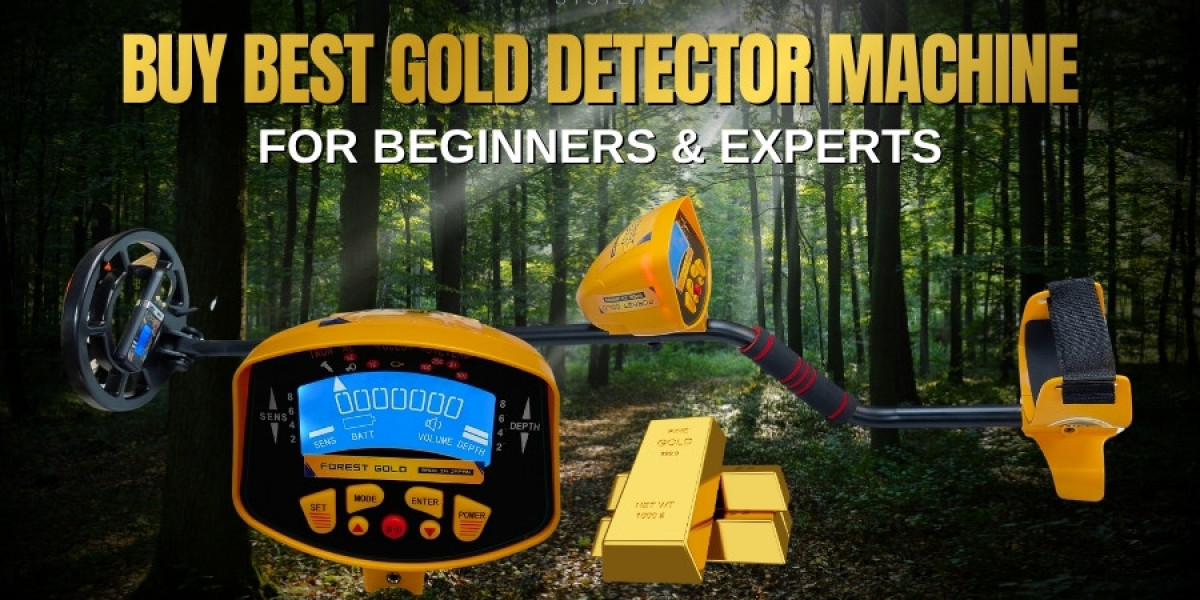Introduction
A gold detector machine is more than just a tool. It is a device that helps you explore hidden layers beneath the ground and identify the presence of gold with measurable accuracy. Whether you search for natural gold nuggets, ancient coins, jewelry, or buried treasure, the right detector gives you the confidence to explore with purpose rather than guesswork.
This article guides you through everything you need to know before you buy a gold metal detector. You will understand how these devices work, the different types available, how to compare features, how to match a model to your experience level, and how to use the device effectively in real environments. By the end, you will have a clear path to choosing the best gold detector for sale that suits your goals, location, and skill level.
What a Gold Detector Machine Actually Does
A gold detector machine uses electromagnetic signals to scan the ground beneath your feet. When the detector coil emits energy into the soil, it interacts with metallic objects below. Gold reflects the signal differently than non-precious metals. The machine captures these signal differences, translates them into tones, numbers, or digital readings, and lets you know that something metallic is present.
You do not need to be a technician to use a gold metal detector. Most detectors today include automatic configurations that help you interpret signals accurately with minimal effort. The more you practice, the faster you learn to recognize patterns, sound responses, and ground feedback.
How Gold Detection Technology Works
Gold detectors rely on electromagnetic frequency fields. When the coil transmits energy, the field expands into the ground. If gold or another metal lies in that field, the signal changes. The detector reads the change, processes the signal strength, and tells you the location and depth.
Frequency and Gold Size
Higher frequencies detect small gold nuggets more easily. Lower frequencies detect large gold objects deeper underground. A well-designed detector balances both so you can find gold of various sizes in different environments.
Ground Minerals and Interference
Not all soil is equal. Some landscapes contain minerals that can create false signals. Gold detectors include ground balancing features to stabilize performance in challenging soil conditions. When a detector can ignore mineral noise, you receive clearer and more confident signals.
Types of Gold Detector Machines
1. VLF (Very Low Frequency) Gold Detectors
These detectors are ideal for beginners. They are sensitive to small gold pieces, lightweight, and affordable. They are best in areas with moderate mineral content such as forests, riverbanks, and farmland.
Strengths
Detects small gold accurately
Easy to carry and operate
Cost-effective for hobby exploration
Limitations
Can struggle in highly mineralized soil
Depth is generally more limited
2. PI (Pulse Induction) Gold Detectors
These detectors are built for experts and deep-level prospectors. They use strong electrical pulses to overcome heavy mineral interference. They are excellent for desert and rocky environments.
Strengths
Deep gold detection
Reliable in mineral-rich soil
Strong signal stability
Limitations
Higher purchase cost
Picks up more types of metal, requiring more signal judgment
3. 3D Imaging Gold Scanners
These are advanced systems for serious exploration. They display underground structures and targets on digital screens, often showing shape and depth estimate.
Strengths
Visual underground mapping
Useful for treasure hunting and archaeological exploration
Can identify gold clusters and cavities
Limitations
Requires training to interpret data
Higher investment level
Choosing the Right Gold Detector Machine Based on Experience
If You Are a Beginner
You benefit from:
Lightweight design
Simple controls
Automatic ground balancing
Clear signal tones
A beginner-friendly gold metal detector lets you focus on learning the basics rather than adjusting complex settings.
If You Are an Intermediate Explorer
You now understand how signals behave. You need:
Sensitivity control
Coil variety
Better depth performance
Improved discrimination features
A mid-level device gives you stronger confidence in varied terrains.
If You Are a Professional Prospector
You search in challenging landscapes and need accuracy at deep levels. You require:
Pulse Induction or 3D detection capability
Multiple detection modes
Clear metal type identification
Long duration battery performance
A professional detector increases your efficiency and reduces wasted efforts.
How to Match Detector Type to Location
Different terrains demand different detector strengths. Soil with high mineral content, such as desert sand or volcanic rock, requires strong ground balancing. Areas near rivers may allow easier detection but require waterproof coils. Forests may present roots and soil movement challenges.
As you explore more locations, you will understand how terrain affects signal clarity. Your gold metal detector should provide stable output across these natural conditions.
Important Features to Look for Before Buying a Gold Detector for Sale
Depth Capability
Depth is a core performance factor. A powerful detector can locate deeper gold deposits, while a shallow detector may only locate surface-level pieces. You want a machine that offers adjustable depth modes based on your exploration goals.
Ground Balancing
This feature helps your detector ignore mineral noise. Automatic ground balancing is best for new users because the device adjusts itself. Manual balancing offers more precision for experts.
Sensitivity Control
Higher sensitivity helps detect fine gold. However, too much sensitivity causes unstable signals. A high-quality detector lets you adjust sensitivity with accuracy.
Discrimination Modes
Discrimination determines whether your detector can separate gold from iron or other low-value metals. This helps avoid unnecessary digging.
Coil Size and Shape
Larger coils detect deeper gold. Smaller coils provide better accuracy in narrow spaces. The ability to switch coils gives you flexibility in different environments.
Battery Life
Exploration takes time, and areas may be remote. A stable battery ensures continuous searching without interruption.
Ease of Use
Your detector’s display should be readable under sunlight and simple to understand.
How to Interpret Signals Correctly
Signal interpretation is a skill gained through experience. A strong signal does not always mean large gold; it could be shallow metal. A weak signal does not always mean small gold; it may indicate deep gold.
You improve accuracy by:
Sweeping the coil slowly back and forth
Approaching the target from multiple angles
Listening to tone variations carefully
Digging consistent, repeatable signals
A gold detector machine rewards patience and accuracy.
Common Challenges and How to Avoid Them
You may encounter situations where soil minerals or surrounding objects distort signals. Learning how to adjust ground balance, sensitivity, and sweep speed helps overcome this. Always test your detector in different terrains to understand how each area affects detection.
Environmental factors like rain, extreme heat, and saltwater can also influence performance. Protect your coil, maintain your device properly, and handle your detector with care.
Using Your Gold Detector Machine in the Field
Before you begin, survey the area visually. Look for natural gold indicators such as quartz, ironstone, and ancient waterways. Practice sweeping the detector in smooth, even motions. Keep the coil level and close to the ground, but avoid touching the surface.
Do not rush. Good prospectors are slow and methodical. Your patience directly influences your results.
Maintaining Your Gold Metal Detector for Long-Term Performance
Maintain your detector after every use. Clean the coil. Check the shaft and joints. Store the device in a protective case away from direct heat. Recharge or replace batteries before field use. A well-maintained detector lasts many years and remains reliable.
Why Choose Gold GPR Gold Detector Machines
Gold GPR designs detectors for reliability across multiple terrains. You get strong depth performance, stable signal interpretation, and simplified operation. Whether you are a beginner or expert, Gold GPR offers models tested in real conditions to ensure accuracy.
Gold GPR detectors emphasize:
High sensitivity to fine gold particles
Performance stability in high mineral environments
Durable design for outdoor field conditions
Clear audio and visual signal feedback
The brand focuses on creating detectors that serve explorers, hobbyists, researchers, and professional prospectors with dependable results.
Buying Mistakes You Should Avoid
Do not select a detector based only on low price. A cheap device may fail in real soil conditions, leading to frustration. Do not believe unrealistic depth claims without evidence. Always check whether the detector fits your location, gold type, and experience level. Do not ignore warranty and after-sales support. Your investment should be protected.
Frequently Asked Questions
Can a gold detector machine detect gold deeply underground?
Yes, especially Pulse Induction and 3D systems designed for deep layer detection.
Can a gold detector identify gold specifically?
VLF detectors can differentiate metals. PI detectors detect metals without specific separation, requiring user interpretation.
Do I need experience to use a gold metal detector?
You can learn quickly. Beginners can start with simple detectors and progress over time.
Can I use a detector near water or rivers?
Yes, choose models with waterproof coils.
Conclusion
Choosing the best gold detector machine is about understanding your goals, your environment, and your level of experience. When you look for a gold detector for sale, study its depth capability, sensitivity range, ground balancing performance, and ease of use. A high-quality gold metal detector gives you the advantage of accurate searching, confident signal interpretation, and reliable performance.
Gold GPR provides detectors that support both beginners and professional explorers. With the right machine and consistent practice, every exploration becomes a meaningful opportunity.








